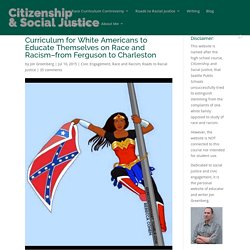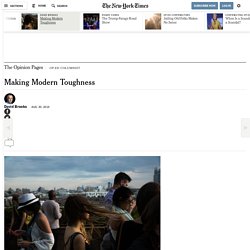

Gene Kummerer: Musings. Curriculum for White Americans to Educate Themselves on Race and Racism–from Ferguson to Charleston. When teaching about race and racism, I invite participants to consider the following analogy: Think of racism as a gigantic societal-sized boot.

“Which groups do you think are fighting the hardest against this boot of racism?” I ask them. Invariably, participants of diverse races answer that those fighting hardest to avoid getting squashed by the boot are people of Color. (Keep in mind that I don’t ask this question on day one of our study of race. Rather, participants come to this conclusion after exploring the concept of White privilege and studying the history of race and racism in the United States through multiple sources and perspectives.) “If that’s true,” I continue, “then who do you think is wearing the boot?” “If that’s true, then whose responsibility is it to stop the boot from squashing them? Everyone has a role in ending racism, but the analogy shows how little sense it makes for only those facing the heel-end of oppression to do all the work. But so much work remains. Problem loading page. Christ Presbyterian Church. Making Modern Toughness. Photo When I ask veteran college teachers and administrators to describe how college students have changed over the years, I often get an answer like this: “Today’s students are more accomplished than past generations, but they are also more emotionally fragile.”

That rings true to me. Today’s students are amazing, but they bathe one another in oceans of affirmation and praise, as if buttressing one another against some insecurity. Whatever one thinks of the campus protests, the desire for trigger warnings and safe spaces does seem to emanate from a place of emotional fragility. And if you hang around the middle aged, you hear a common story line to explain the rise of the orchid generation.
But today, helicopter parents protect their children from setbacks and hardship. There’s a lot of truth to that narrative, but let’s not be too nostalgic for the past. And then many people turned to alcohol to help them feel anything at all. There are moments when they feel swallowed up by fear. Walking While Black. EDITORIAL: What I Said When My White Friend Asked for My Black Opinion on White Privilege. By Lori Lakin Hutcherson, GBN Editor-in-Chief Yesterday I was tagged in a post by an old high school friend, asking me and a few others a very public, direct question about white privilege and racism.
I feel compelled not only to publish his query but also my response to it, as it may be a helpful discourse for more than just a handful of folks on Facebook. Here’s his post: “To all of my Black or mixed race FB friends, I must profess a blissful ignorance of this “White Privilege” of which I’m apparently guilty of possessing. By not being able to fully put myself in the shoes of someone from a background/race/religion/gender/ nationality/body type that differs from my own makes me part of the problem, according to what I’m now hearing. So that I may be enlightened, can you please share with me some examples of institutional racism that have made an indelible mark upon you?
Here’s my response: Hi, Jason. So, again, I’m glad you asked, because I really want to answer. 1. 2. 3. 4. 5. 6. 7. 8.